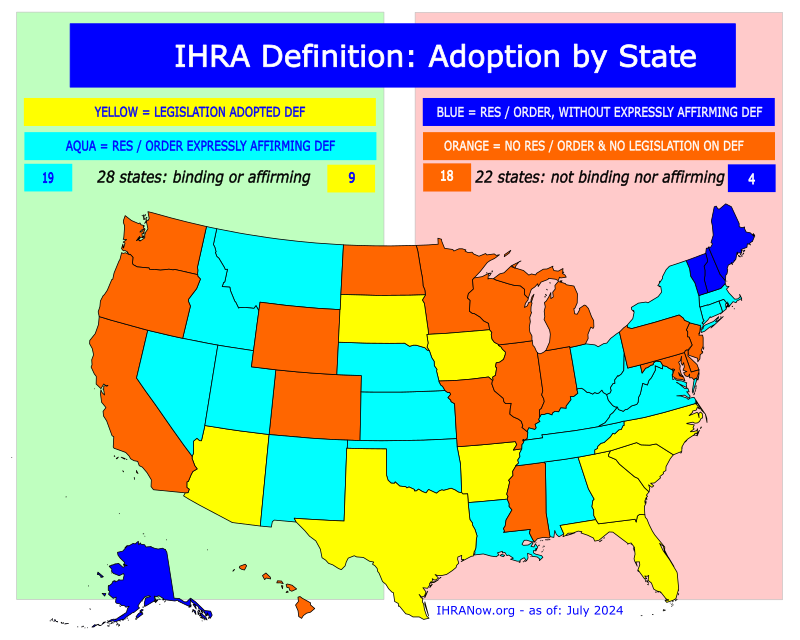About IHRA Now
We are a grassroots campaign for ...
- Adoption of the working definition of antisemitism by International Holocaust Alliance (IHRA), on a statewide level, in all 50 states. As of mid-2024, we count 28 states (and the District of Columbia) having adopted the definition but still 22 more that have not yet joined them. (Some of the states we count as not adopting have passed resolutions about Holocaust remembrance but without expressly affirming the value of the definition.)
- State legislation wherever possible - not just a proclamation or executive order by the governor - to ensure that antisemitism awareness and efforts to identify it are backed by "laws on the books."
- Increasing awareness of the importance of the IHRA definition across every state and at every level, whether the definition has been adopted statewide or not, and whether adoption is done by a non-binding resolution, order or proclamation or by binding legislation.
In short, we are building a national movement to make the IHRA definition the acknowledged standard on how contemporary antisemitism is perceived, understood and combatted. Attacks on the definition, which have mostly come up precisely because it is effective and useful, are both wrong and misguided.

Why is this necessary?
Ideogically extremist antisemitism is rising alarmingly fast. And yet in the 18 states that have yet to adopt the IHRA definition, there seems to be too limited impetus to make that happen - so a grassroots efforts is needed.
Why is this a good idea?
Unless a state adopts the IHRA definition, it will not have the best tool available to combat antisemitism driven by ideological extremism. "Competing" definitions of antisemitism - which were only first disseminated after the IHRA definition was introduced in 2016 - attempt to undermine the IHRA definition's adoption, precisely because it identifies antisemitism as clearly as possible. The IHRA definition is the only one that addresses different forms of extremist ideologically-driven hatred toward the Jewish people in the world today, including by those who attempt to vilify "Zionists" because of their support of Israel as a Jewish state.
The IHRA definition can be useful for purposes of education; for assessing the nature of nonprofit organizations that claim to support human rights; for imposing possible enhancements in sentencing for hate crimes; and for other purposes. It has been adopted by the U.S. State Department and is in effect (by a 2019 executive order ) for the U.S. Department of Education's enforcement of Title VI of the Civil Rights Act. It is also aligned with the IHRA's policy recommendations to recognize and counter Holocaust distortion, which is a common feature of ideologically extremist antisemitism. Congress has also acted but the bill has not yet been voted on by the Senate. And even if Congress acts, all states should also adopt the IHRA definition statewide, for their own purposes.
Interested?
Get in touch! Grassroots is all about building a campaign with everyone's active support. Let's work together to tackle the growing crisis of antisemitism caused by ideological extremism - on both the far right and the far left.